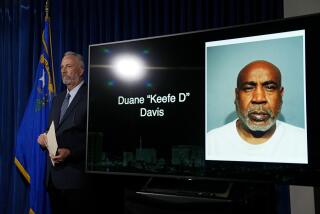Family of Slain Rapper Gets a Rebuff
- Share via
Lawyers for the city of Los Angeles accused attorneys representing the family of slain rapper Notorious B.I.G. of going to “odious” and “absurd” lengths --including lying -- to “satisfy their ambition to extract hundreds of millions of dollars” from city coffers, according to papers filed Tuesday in federal court.
The stinging brief came as a result of the latest twist in the wrongful-death lawsuit filed against the city by the family of Christopher Wallace, also known as Biggie Smalls.
Wallace was gunned down outside the Petersen Automotive Museum on March 9, 1997, after a music industry party.
The murder has never been solved, fueling rumors that corrupt LAPD officers moonlighting for a rival rap label may have been involved.
In 2002, Wallace’s family, including his mother, sued the city, charging that LAPD officials covered up police involvement in the rapper’s death.
The case went to trial last year, only to end in a mistrial after the family’s attorney said he received an dramatic eleventh-hour tip that the LAPD had withheld evidence.
Perry Sanders told the court he got an anonymous late-night phone call informing him that former Police Officer Rafael Perez had talked to a jailhouse informant about the murder.
In response to Sanders’ statements, LAPD internal affairs investigators locked down the department’s Robbery-Homicide Division and seized tapes and transcripts between the informants and two detectives.
Officials struggled to explain why that information, along with hundreds of pages of police personnel and disciplinary files the plaintiffs had sought, had not been turned over. They said it was an innocent mistake.
But Judge Florence-Marie Cooper ruled that the evidence had been concealed deliberately. She declared a mistrial and ordered the city to pay $1.1 million in sanctions.
Then, in another reversal, attorneys for the city appeared in court last month with what appeared to be proof that Sanders had known all along about an alleged conspiracy between Perez and former Officer David Mack.
Vincent Marella, a private attorney working for the city, held up a four-page report prepared in November 2002 by an investigator working for Wallace’s family. The report detailed an interview with a prison informant that revealed the very information that Sanders claimed he had only learned of in that late-night phone call in 2005. Marella accused Sanders of deliberately deceiving the court and staging a cynical “drama of outrage.”
Cooper said she felt “the court has been totally deceived” and described herself as “so angry right now I can hardly even speak.” She also said there was “no question that the LAPD had been concealing evidence that should have been turned over.”
A week later, Sanders answered that the city was “acting out of a desperate attempt to prevent additional discovery about police misconduct.”
On Tuesday, the city filed its response to the plaintiffs. In prose that at times veered into outraged sarcasm, city lawyers said that “when the rhetoric and ad hominem are stripped away, plaintiffs’ response is revealed as no response at all.”
Dorothy Wolpert, another lawyer hired by the city, suggested that the plaintiffs introduced the claim of an eleventh-hour tip because perhaps “plaintiffs were not happy with the way the trial was developing.”
She asked that the judge stop discovery and allow a new trial to begin “as soon as its calendar will allow.”
Sanders, the attorney for the family, denied misleading the court, saying he had given the relevant information about the informant’s report to attorneys for the city in 2002, and again last summer. “The record speaks for itself,” Sanders said.
More to Read
Sign up for Essential California
The most important California stories and recommendations in your inbox every morning.
You may occasionally receive promotional content from the Los Angeles Times.













